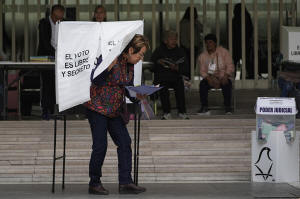Mexico's first judicial elections are marked by low turnout, confusion
and disillusionment
[June 02, 2025]
By MEGAN JANETSKY, MARÍA VERZA and FABIOLA SÁNCHEZ
MEXICO CITY (AP) — Mexico held its first-ever judicial elections Sunday,
stirring controversy and sowing confusion among voters who struggled to
understand a process set to transform the country's court system.
Polls closed and poll workers began counting colored ballots Sunday
night with the question hanging in the air of what will become of
Mexico's judiciary, the answer to which will only emerge in the coming
days as results roll in.
Mexico's electoral authority announced late in the night that 13% of
Mexico's 100 million voters cast ballots at the polls, lagging far
behind the 60% turnout just a year before during the country's
presidential election.
Nevertheless, Mexican President Claudia Sheinbaum called the voting “a
complete success."
“Mexico is the most democratic country in the world,” she added.
Experts warned of startling low turnout in the lead up to the historic
elections due to the mindboggling array of unfamiliar choices and the
novelty of voting for judges. Experts say those factors may throw into
question the legitimacy of the election, which has faced months of
fierce scrutiny.
Sheinbaum, a member of Mexico’s ruling party, Morena, rejected the
criticisms and insisted the election would only only make Mexico more
democratic and root out corruption in a system that most people in the
country believe is broken.

“Whoever says that there is authoritarianism in Mexico is lying,” she
said. “Mexico is a country that is only becoming more free, just and
democratic because that is the will of the people.”
While some voters said they felt pushed to vote in an election they felt
would determine the fate of the country’s democracy, many more expressed
a deep sense of apathy, citing disillusionment due to decades of
corruption and lack of basic information about the vote.
“I'm not interested (in voting). Parties and their messages — they come
and they go. It's all the same,” said Raul Bernal, a 50-year-old factory
worker in downtown Mexico City walking is dog.
A historic vote
Even without the final tally, the results of the vote are set to
transform Mexico's judiciary. Morena overhauled the court system late
last year, fueling protests and criticism that the reform is an attempt
by those in power to seize on their political popularity to gain control
of the branch of government until now out of their reach.
“It's an effort to control the court system, which has been a sort of
thorn in the side" of those in power, said Laurence Patin, director of
the legal organization Juicio Justo in Mexico. “But it's a
counter-balance, which exists in every healthy democracy.”
Instead of judges being appointed on a system of merit and experience,
Mexican voters have cast ballots to choose between some 7,700 candidates
vying for more than 2,600 judicial positions.

Mexicans head to the polls
Some of the country's voting centers opened with only a trickle of
people and small lines forming throughout the day.
Esteban Hernández, a 31-year-old veterinary student, said he didn’t
agree with electing judges and doesn’t support Morena, but came to vote
because “since there isn’t much participation, my vote will count more.”
He had studied the candidates on a website listing their qualifications
and decided to pick those who had doctorates. Other critics said they
only voted for the Supreme Court and other top courts.
[to top of second column]
|

A voter leaves after casting her ballot in Mexico's first judicial
elections, in Mexico City, Sunday, June 1, 2025. (AP Photo/Marco
Ugarte)

Francisco Torres de León, a 62-year-old retired teacher in southern
Mexico, called the process "painstaking because there are too many
candidates and positions that they’re going to fill.”
Sheinbaum's predecessor and political mentor, former President Andrés
Manuel López Obrador, who had pushed through the judicial reform but
remained out of the public eye since leaving office last year, voted in
Chiapas near his ranch.
“I wanted to participate in this historic election,” he said. “Never in
the history of our country … have the people decided and had the right
to elect judges.”
Democratic concerns
The process has raised concerns.
Civil society organizations like Defensorxs have raised red flags about
a range of candidates running for election, including lawyers who
represented some of Mexico's most feared cartel leaders and local
officials who were forced to resign from their positions due to
corruption scandals.
Also among those putting themselves forward are ex-convicts imprisoned
for years for drug trafficking to the United States and a slate of
candidates with ties to a religious group whose spiritual leader is
behind bars in California after pleading guilty to sexually abusing
minors.
Others like Martha Tamayo, a lawyer and former congresswoman from
conflict-ravaged Sinaloa, cast doubt on projections that the election
could hand even more power over to criminals and criminal groups, simply
because they already have a strong control over courts.
“The influence of criminal groups already exists,” she said. “The
cartels go with the judges (bribe them) whether they are elected or
not.”

‘You have to start with something
’
The public has been plagued by confusion over a voting process that
Patin warned has been hastily thrown together. Voters often have to
choose from more than a hundred candidates who are not permitted to
clearly voice their party affiliation or carry out widespread
campaigning.
As a result, many Mexicans said they were going into the vote blind,
though others voting Sunday noted they supported the process despite the
confusion.
Mexico's electoral authority has investigated voter guides being handed
out across the country, in what critics say is a blatant move by
political parties to stack the vote in their favor.
“Political parties weren’t just going to sit with their arms crossed,”
Patin said.
While still unsure if his vote would improve access to justice for many
Mexicans, 61-year-old actor Manuel José Contreras defended the election,
Sheinbaum and her party. He cast his ballot with a tone of hope.
“The reform has its problems but we needed an urgent change,” he said.
“You have to start with something.”
___
AP journalists in Mexico Edgar H. Clemente in Tapachula, Alba Aléman in
Xalapa and Fernando Llano in Mexico City contributed to this report.
All contents © copyright 2025 Associated Press. All rights reserved |